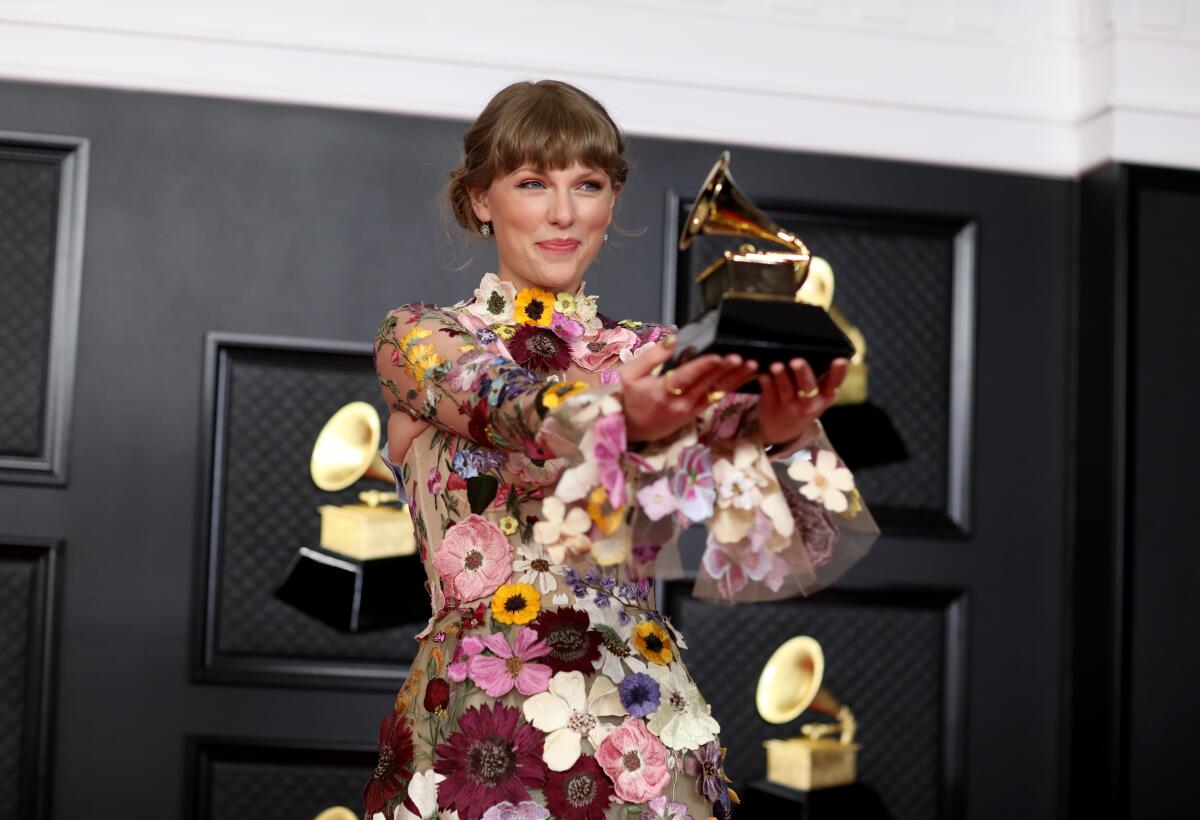A principled stand, a bonanza for Swifties and a shrug from us: Taylor Swift’s made-over ‘Fearless’

- Share via
On Jan. 31, 2010, Taylor Swift stood onstage at the Grammy Awards and promised that the story of that night — the night “in 2010 that we got to win album of the year at the Grammys,” as she put it — would be the one she’d tell her grandkids over and over again when she was 80.
Well, maybe.
In the decade and change since her sophomore LP, “Fearless,” took the Grammys’ most prestigious award, Swift has won album of the year two additional times — including just last month, when the singer’s victory with the platinum-certified “Folklore” made her the first woman to three-peat in Grammys history.
“Cow is king,” says Junior Varsity singer-songwriter Greg Aram, who was charged with trespassing on April 2 after modifying the Hollywood sign.
But if her treasured memories have gotten more crowded than she might’ve anticipated, “Fearless” still looms large in the Taylor Swift mythology. Released in 2008, when she was 18, the record captures her arrival at true superstardom; it sold more than 10 million copies and spun off her first top 10 pop hit in the Romeo and Juliet-themed “Love Story.”
Now Swift, 31 and on her fourth full-length in less than two years, has returned to the album as the first installment in her much-discussed plan to rerecord her six earliest studio LPs following Scooter Braun’s 2019 purchase of her old label Big Machine. (The music exec, known among other things for his onetime work with Swift’s nemesis Kanye West, last year sold Big Machine — and along with it the singer’s master recordings — to a Westwood-based investment fund for more than $300 million.)
Swift has been open about her motive for making “Fearless (Taylor’s Version),” as she’s calling the new set released Thursday night: She’s looking to devalue those masters by essentially replacing them in the marketplace with a product she owns. In the future, when a filmmaker or ad agency wants to use one of her songs in a movie or TV commercial, or when a fan streams it on Spotify, she’s betting they’ll turn to these renditions instead of those in which Braun reportedly retains a financial interest.

Yet the rerecording project makes unique creative sense for an artist sufficiently obsessed with time and aging and nostalgia that she spent her big Grammys speech as a teenager imagining herself in senior citizen-hood. For most acts, this whole enterprise would seem crassly commercial; for Swift, it presents a chance to live out a key lyric from one of “Fearless’” emotional highlights: the strummy, impossibly yearning “Fifteen,” about wishing “you could go back and tell yourself what you know now.”
Which isn’t to say she’s not seizing an opportunity to ring up more business. Beyond the 13 songs on the original “Fearless” — its other hits include “You Belong With Me” and “White Horse” — “Taylor’s Version” features 14 bonus tracks, a half-dozen of which have never been heard before; they’re newly recorded productions of tunes written during the “Fearless” era from what Swift calls her vault, complete with interest-piquing contributions from Maren Morris and Keith Urban.
One of the vault selections, “Mr. Perfectly Fine,” caused a hubbub online this week when fans deduced that Swift had written the sharply witty song in the aftermath of being dumped by Joe Jonas. (Among her better epithets in a tune full of them: “Mr. never told me why / Mr. never had to see me cry / Mr. insincere apology so he doesn’t look like the bad guy.”)
So how does the “Fearless” redo compare to the old album? It would take a deeply devoted Swiftologist — of which there are millions, each eagerly armed with a fine-toothed comb — to suss out the minute differences, so thoroughly has the singer re-created her original arrangements. Accompanying her are many of the folks who played on “Fearless” and on tour with Swift around the same time, with the conspicuous exception of her former co-producer Nathan Chapman, who, judging by his recent work with other Big Machine acts, perhaps elected not to rock a professional boat.

The most significant change is in Swift’s singing voice, a once-brittle instrument that of course has gotten deeper, huskier and more flexible since the late ’00s. But she only really takes advantage of that shift a couple of times — in “Fifteen,” which now carries some of the disappointment her fresh-faced narrator had yet to face, and “The Best Day,” an earnest tribute to her parents that skirted corniness a decade ago but now feels lined with an adult understanding of childhood. (That Swift’s mother has since battled cancer repeatedly makes the song only more poignant.)
As for the lightweight bonus material, which she cut in the studio with her “Folklore” and “Evermore” collaborators Aaron Dessner and Jack Antonoff, none of it argues that it deserved a place on “Fearless,” though “Mr. Perfectly Fine” comes close. Lots of mid-tempo acoustic strumming here; lots of lyrics missing the trademark specificity that defines Swift’s A-game.
Still, for an artist who would appear to have earned a hiatus — “Lover,” though it seems an eternity ago, came out in the pre-pandemic summer of 2019 — Swift has put a remarkable amount of energy into this would-be practical exercise.
Only she could make bare-knuckled capitalism feel like a moral act.
More to Read
The biggest entertainment stories
Get our big stories about Hollywood, film, television, music, arts, culture and more right in your inbox as soon as they publish.
You may occasionally receive promotional content from the Los Angeles Times.









